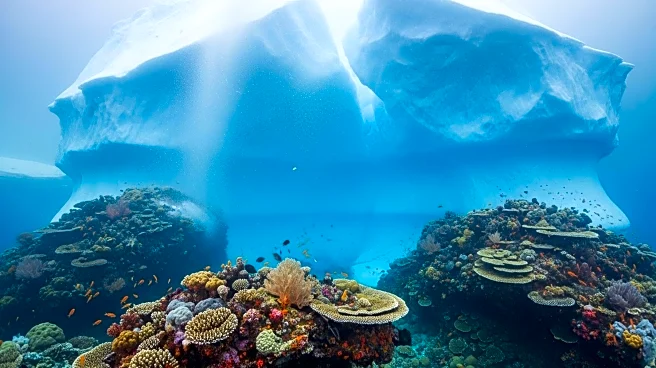What's Happening?
A significant geological event occurred when iceberg A-84 detached from Antarctica's George VI Ice Shelf, revealing a previously hidden underwater ecosystem. This newly exposed area, approximately the size of Chicago, was explored by scientists aboard the research vessel R/V Falkor (too). Using the ROV SuBastian, they discovered a thriving marine ecosystem, including sponges, corals, anemones, icefish, giant sea spiders, and octopuses. These organisms have adapted to survive in complete darkness and freezing temperatures, suggesting the ecosystem has been stable for decades, if not centuries. The discovery highlights the resilience of life in extreme environments and provides a rare opportunity to study a pristine marine habitat.
Why It's Important?
The discovery of this hidden ecosystem underlines the resilience of life in extreme conditions and offers insights into how organisms can survive without sunlight. This knowledge could inform studies on potential life in similar environments on other planets or moons. Additionally, the event serves as a climate change indicator, as the stability of these ecosystems may be threatened by rising temperatures and shifting sea ice. The George VI Ice Shelf plays a crucial role in buttressing inland glaciers, and its destabilization could lead to accelerated glacier movement and rising sea levels, impacting global coastlines.
What's Next?
Researchers are now analyzing the data and specimens collected to determine if any new species have been discovered. This process could take months or years. The findings emphasize the need for further exploration of Earth's last wild frontiers, especially as climate change continues to alter these environments. Understanding how these ecosystems adapt or decline in response to environmental changes is critical for predicting future impacts on global biodiversity and sea levels.
Beyond the Headlines
The event highlights the ethical and scientific importance of preserving and studying Earth's remaining untouched ecosystems. As climate change accelerates, these environments may offer crucial insights into the adaptability of life and the potential consequences of environmental shifts. The discovery also raises questions about the long-term impacts of human activity on remote ecosystems and the need for international cooperation in environmental conservation efforts.










